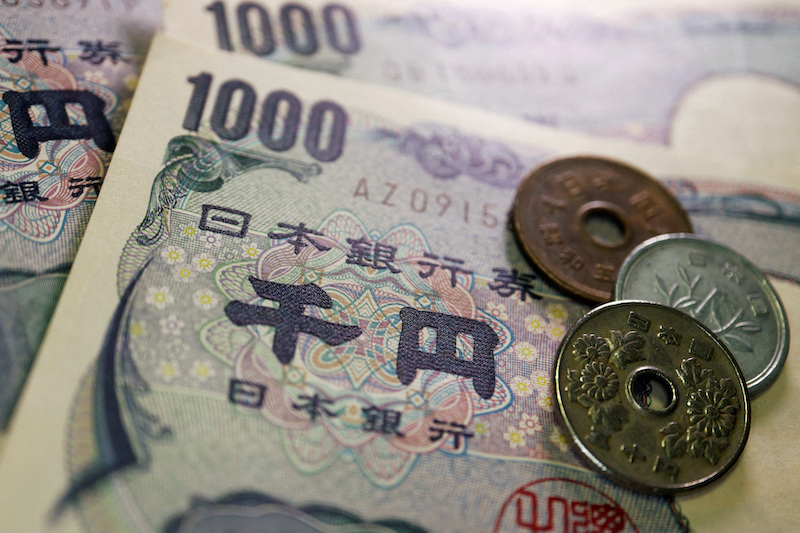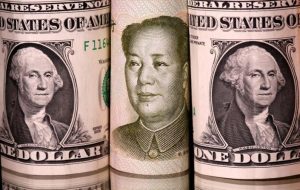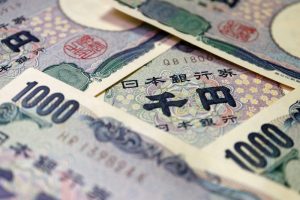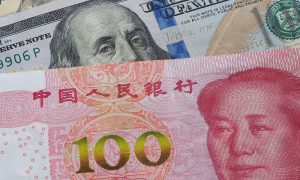Japanese authorities chose silence on Wednesday when they were asked whether they had stepped into the market to prop up the yen.
After sliding below the psychologically important 150 per dollar mark to its weakest level in a year, the yen strengthened sharply on Tuesday, leading some analysts to believe Tokyo had intervened to support the currency.
Speaking to reporters, Finance Minister Shunichi Suzuki declined to comment on whether Tokyo had stepped in, and repeated that currency rates must move stably reflecting fundamentals.
“We’re ready to take necessary action against excess volatility, without ruling out any options,” Suzuki said, a view echoed by top currency diplomat Masato Kanda.
Also on AF: Bond Market Sell-Off Sparks Global Slowdown Alarm Bell
In a sign of the government’s growing alarm over the yen’s weakness, Kanda said he met Prime Minister Fumio Kishida later on Wednesday to “discuss the economy in general.”
Kanda declined to say whether he discussed the yen with the premier, but told reporters after the meeting that any intervention would target volatility rather than yen levels.
The dollar stayed well off the 150-mark in Asia on Wednesday and stood at 148.93 yen in early European trading, as the remarks from Suzuki and Kanda, who are in charge of deciding whether and when to step in, kept investors on alert over intervention risks.
But it has depreciated around 12% so far this year, and some analysts questioned how long Tokyo can keep yen bears at bay.
The Bank of Japan’s money market data showed it’s likely Japan did not intervene in the currency market on Tuesday, though market players said they needed to look at data available on Thursday to confirm that.
Japanese authorities are facing renewed pressure to combat the sustained depreciation of the yen, as investors confront the prospect of higher-for-longer US interest rates while the Bank of Japan remains wedded to its super-low interest rate policy.
BOJ on High Alert
Highlighting the conflicting goals Japan is chasing, the BOJ conducted emergency bond buying on Wednesday to keep long-term rates from rising much and hurting the fragile economy.
The BOJ’s decision in July to allow long-term rates to rise more freely did little to reverse the yen’s downtrend, as markets focused on Governor Kazuo Ueda’s pledge to keep easy policy until durable growth in wage and inflation is foreseen.
Kanda brushed aside the view that authorities were trying to defend a certain yen level, saying that they look at various factors with a focus on market volatility.
“If currencies move too much on a single day or, say, a week, that’s judged as excess volatility,” Kanda said.
“Even if that’s not the case, if we see one-sided moves accumulate into very big moves in a certain period of time, that’s also excess volatility,” Kanda added. He declined to comment on whether the overnight yen moves were excessive.
But former BOJ official Hideo Kumano warned against taking the comments at face value, pointing out that Tuesday’s yen spike had the footprints of intervention.
“It’s a strong show of resolve by Japanese authorities that they won’t tolerate the yen’s decline below 150,” said Kumano, who is now chief economist at Dai-ichi Life Research Institute.
“By not disclosing whether they’ve intervened, authorities can instil caution in the market on what they could do next.”
Japan Inflation Above Target
While a weak yen gives Japanese exports a boost, it has been a headache for both policymakers and households alike, by inflating the cost of raw material imports.
With inflation already exceeding the BOJ’s 2% target for more than a year, the yen’s recent declines put pressure on the central bank when it meets for a rate review ending on October 31.
“If the dollar/yen moves sharply above 150, the BOJ could push forward the timing of a policy tweak,” said Ryutaro Kono, chief Japan economist at BNP Paribas Securities, predicting that there was a slim chance the bank could act this month.
Tokyo last intervened to buy yen in September and October last year, when the currency eventually slumped to a 32-year low of 151.94 per dollar.
- Reuters with additional editing by Sean O’Meara
Read more:
Japanese Yen Slips to 2023 Low, US Dollar at One-Month High
Watch for BOJ Intervention: Dollar at 7-Month High Against Yen
Yield Curve Call Sparks BOJ Policy Doubts as Yen Struggles
Japan Finance Ministry on Alert as Weak Yen Causes Concern
























